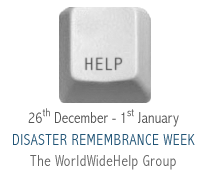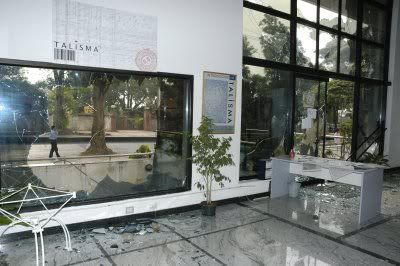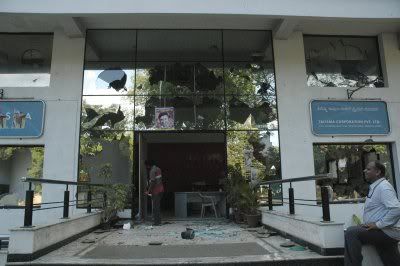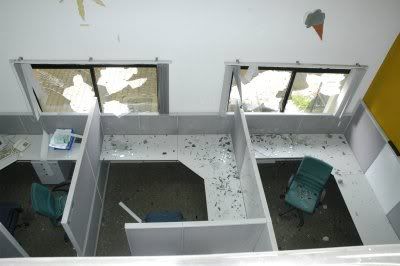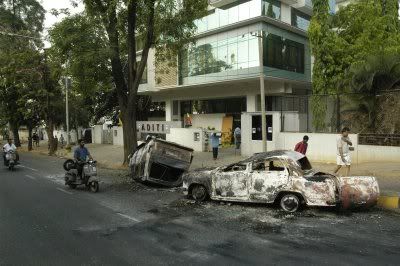Archive for the ‘Society’ Category
I hate this so called “Third World”
What does Preity Zinta say on The BBC? She says “India needs some simple things so that it would not remain a third-world country anymore”.
Sometime in first half of the last century, someone in England came up with a term that conveniently described all the undeveloped countries. It summarised the poverty, the illiteracy, the inhumane conditions and all the bad things the west can think about into this new word and a makeshift new world, it was called “The Third World”.
Our leaders chose to call it “Developing Countries”. That’s a term less harsh, but that is it.
I don’t believe in this “Third World” concept. I think it was very convenient for some. It still is. But I like to think that there is no “Second” or “Third” world.
There is only one World.
Till the time this word is used in the context mentioned above, I must say, there remains a truth to be accepted, a reality to be braved and work to be done.
You, me and Preity Zinta stay in the same world. If you accept the existence of The Third World, what is the difference then, between you and the person who invented this term?
Things have to start changing first in the minds of people. People not in the west, but people right here.
Bang, Bang, Bangalore
This is what happened to Bangalore when veteran actor Rajkumar died.
These pictures came via an email forward.
I am scared of this. I have never seen this face of Bangalore.
The Mall Mauls
A 20 minute stay in the mall nearest to my house (and one of the biggest in the city) during the not-so-peak hours reveals how people are accepting the Mall culture. (Also, How I am going about accepting the same.)
Curiosity brings them here. The Advertisement and Marketing department of the respective brand takes care of the rest. Lets talk about the first point, Curiosity.
A few examples here could be a better way to explain this.
A man carries his 5 year old son on his shoulders, gets him an ice-cream cone (From McDonalds) and walks towards the outer boundary of the building and sits there. He has just come out of the mall and he has one rapidly melting ice-cream cone to show for his shopping. In his shirt pocket, he carries the brochure of the Nokia N-Series phone. In the rare moments that the son fails to get his papa’s attention, the papa is busy staring, with wide eyes, the crowd that the mammoth building keeps churning inside.
During almost every visit to the mall, I need to use the escalator. And everytime I see someone struggle trying to use it. They are afraid of putting their feet on this moving carpet of metal. They are overwhelmed by the brands that surround them, all of a sudden, but they keep coming in thousands.
They are afraid but they are curious too. It’s like learning to swim. Because they like it when they survive those little anxious moments.
So this is the face of the changing India. The Big-town and The Small-town India coming to terms with the Great Mall Culture.
Once they get in, the advertisements take control. Have you noticed how every single minute you spend on the street is full of advertisements? Lets go back to the Mall for a moment here. I see a giant Shahrukh Khan asking me to have a Cola. On a huge billboard, a woman tells me to buy this particular brand of Jeans. You can’t just miss the woman, such is the attention her figure demands. You know, I think it’s funny how nowadays they manage to advertise about clothes without letting the models who advertise for it, wear any.
Then, there are on-the-spot saloon-style-haircuts from a shampoo company. One malt product company (no, not beer) wants you to try their new offering in ice-cold milk. A few stalls ahead, a mobile phone, for just Rs.22,000. Just? They would have laughed if a decade back someone had even suggested the idea of selling a phone for this amount. And even if they all got convinced about it, no one would have believed that people would actually buy it. But people are buying it you know.
They take personal loans to buy a phone nowadays.
The feeling I get in the 20 minutes I manage to stay in this very stressful place is that everyone wants my money. Everyone. They want me to come, open my wallet and spend some cash or swipe the plastic. But if I agree to the job, they’ll take everything.
So, I’m backing out.
What women want
A sense of security, of course.
Yesterday’s Sunday Magazine of The Hindu carries a very thought provoking, well-researched article by Kalpana Sharma. The article is titled “What Bush did not know” and contrary to the impression this title may give you, this is not an article focussing on Bush Jr’s recent visit to India.
Instead, the article throws open an issue that often has provoked debates but more often than not, has failed to find solid conclusions.
Consider this — Of the 14000 people interviewed in Delhi, 50% of women do not feel safe in the city. Nine out of ten women who used public transport felt unsafe about it. 45% of women felt unsafe at their workplace.
These are staggering figures. These are disturbing figures.
There is more. Delhi records the highest percentage of reported crime against women. Mind my words here, reported crime.
Keep in mind, a big part of these crimes go unreported. Obviously, there is more to it than what meets the eye.
So what can be done? A lot can be done if only the cities are planned keeping in mind the threats faced by the most vulnerable of the society. Poor people and women working late hours among them.
As the author rightly points out, three factors need to be considered — The Environment, The Poor and The most vulnerable. Roads could be well lit for example. We could do with more emergency services. Going to the Police and invoking the law should be encouraged.
But obviously, as evident, Malls and shopping centres are the money churners now and the Government, take any State Government, has half a dozen of these projects going on in the main cities.
There is nothing wrong and I don’t have anything against it, but I always have felt, the basic needs of the city should come first. What is the point of having glittery, seven floor shopping centres if a city doesn’t have well lit roads. Even in Bangalore, the city where I live, a lot of the colony roads, or whatever is left of them, are enveloped in darkness after sunset. Clearly, a lot can be done about it but in the past one year that I have been here, I have seen negligble development regarding the city’s infrastructure.
Then of course, is the factor of the mental attitude of people. In a hypothetical situation where we may have the same city conditions in both Delhi and Bombay, women in Bombay are bound to feel safer than their counterparts in Delhi. As the author rightly points out again, the difference here is in the ‘way women in public spaces are viewed in the north and the south’.
Meanwhile, please read the article here.
On Rediff Chat
I had my own doubts about the recently concluded India-US Civil Nuclear Deal. The administration of both countries insist that this has nothing to do with the Bomb but the critics say otherwise. I am not a critic of the whole Nuclear deal per-se, but yes, I am concerned and I have my own doubts about the same. Since I am still reading all the material I can get on it, I am yet to arrive on a conclusion of my own. On the whole, I hope that the critics are wrong.
Yesterday night, rediff.com organized a chat with Dr. Sumit Ganguly. SG, as he prefers to calls himself, is an expert in the political affairs regarding the Indian Subcontinent. He is the “Rabindranath Tagore Professor of Indian Cultures and Civilizations”, and also Professor of Political Science, at the Indiana University. His articles have been published in publications like “The Bulletin of the Atomic Scientists” and “The Washington Quarterly”.
I went to the chatroom with my questions, and to my pleasant surprise, Dr Sumit answered all of them. Understandably, his answers were precise and to the point. Here, I would like to post our conversation.
Truman asked, Dr.Ganguly, why does this deal matter so much? Nuclear Energy would amount to a maximum of 6-7% of India’s total need of energy.
Sumit Ganguly answers, No, the estimates are considerably higher especially if one can modernize existing plants and add new ones. Energy efficiency in India is extremely low.
Truman asked, Thanks for replying to my question, SG. Do you think a Nuclear Bomb equipped India is better for America?
Sumit Ganguly answers, Not really. India should have its nuclear arsenal for its own strategic reasons.
Truman asked, Dr.Sumit, then the theory of “powering India to counterbalance the ‘China’ threat” is flawed? Does it exist in the first place? Because if it does, then I am sure a Nuclear (read Bomb) powered India is what America needs.
Sumit Ganguly answers, Yes, it is. Because I doubt that very many Indians want to play that role even while they perceive a legitimate threat from China.
Truman asked, SG, then would it be safe to conclude that the Nuclear Deal has NOTHING to do with the bomb? And you also mentioned that you do not see China offering a similar deal to Pakistan. Why not?
Sumit Ganguly answers, It has to do with accepting the reality of India’s nuclear status, its role as a growing regional power and with an interest in India’s markets.
Truman asked, One last question sir. Why don’t you see a similar deal in offing for Pakistan from China?
Sumit Ganguly answers, Largely because the Chinese do not wish to provoke the United States and also they have their own misgivings about Pakistan.
So there. The full chat transcript can be found on rediff, here.
Typicial, Typical Roy
On a comeback trail from what seems to be my longest break from Blogosphere in the last 3 years, I present you Arundhati Roy’s Article in today’s Hindu.
I can’t help but say, this is typical Arundhati. Overly aggressive but yes, making a point.
Lest We Forget
Last Sunday, on Christmas, for NDTV to come up with a story on the first anniversary of Tsunami was very thoughtful, probably, one of the few examples of responsible journalism. While most of the world looks ahead to the celebrations and joy the new year has in store, it is also required that we look back. Because if we don’t look back, we don’t learn. We need to look back, lest we forget.
I had been searching, without success, at NDTV.com archives for a link to that story, to share it here, with you. Alaphia, a fellow blogger and one of the journalists who covered the report on Tsunami, has shared the very same script that she had narrated on the NDTV story. Thank you so much, Alaphia.
Please read it here.
And yes, this is remembrance week.
Lest we forget.
